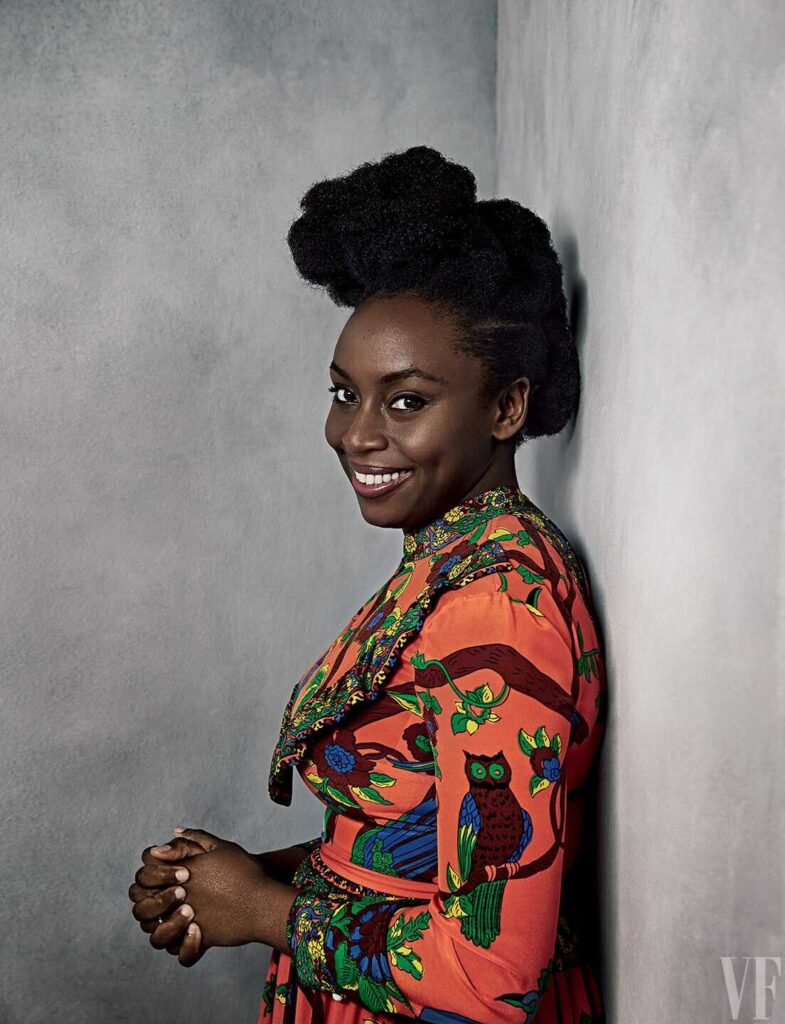Chimamanda Ngozi Adichie is one of Nigeria’s most prominent faces. She’s the author of Americanah and We Should All Be Feminists, winner of the O. Henry Prize and the National Book Critics Circle Award, and the recipient of a MacArthur Genius Grant. Her accomplishments are staggering.
Around the world, though, the award-winning author has also achieved a rare feat for a writer — she’s crossed over dynamically from being solely a literary icon to become a force in popular culture as well. Some might know Adichie as “the feminist featured on a Beyonce track” (snippets of Adichie’s famous 2013 TEDx talk were woven into the song “Flawless”).
As Adichie’s platform boomed, her message began to resonate past the written word and to a new crop of fans. The New York Times’s T Magazine featured her in a cover story for its “Greats Issue.” Brad Pitt and Lupita Nyong’o jumped on board to produce and adapt Americanah. With that type of notoriety, the fashion world followed suit. Suddenly we saw the Nigerian author in the front row during Paris Fashion Week and up close in beauty campaigns (to borrow from Beyonce, Adichie’s makeup is always “I woke up like this” enviable). Adichie even served as a source of inspiration for Dior’s artistic director, Maria Grazia Chiuri, who paid homage to the Nigerian novelist in her debut collection with the brand. Chiuri’s spring 2017 collection featured the instantly popular “We Should All Be Feminists” T-shirt inspired by Adichie’s TEDx talk and book of the same name.
While we don’t usually think of writers as fashion icons, Adichie’s put-together elegance, grace, and exquisite taste helped her earn that distinction. It’s why when she announced on Facebook last May that she was trading in a designer label wardrobe to primarily wear clothing native to her home country, it resonated. She decided to launch Project Wear Nigerian in response to the country’s recent challenges.
“When Nigeria’s economy went into a recession as a result of the decline in oil prices and a retrograde government policy, there was a lot of rhetoric about ‘buying Nigerian-made products’ to help the economy,” Adichie said via email. “I already bought Nigerian fashion, but I thought it might be interesting to wear only Nigerian-made clothes. I hoped to bring a bit of attention to Nigerian fashion, especially to the smaller names, and I also wanted to do my bit in supporting Nigerian-made things.”
Since penning that post, Adichie says she’s worn mostly Nigerian-made clothing to her public and private events over the last few months. In the rare instance when she doesn’t wear Nigerian clothing (like at the recent Glamour Women of the Year Awards, where she wore Dior to honor Chiuri), she incorporates Nigerian-made accessories.
“I wanted very much for the project to feel organic and accessible, and not terribly ‘exclusive,’” she said. “For the Glamour event I wore a beautifully inspired coat by The Ladymaker and an ethereal bag by Dot fashions.”
To help the project take flight, Adichie enlisted her nieces Chisom and Amaka to create an Instagram page documenting her looks.
“My aunt’s always been hopeless with social media,” Chisom said via email. “[My sister and I] wanted to have a say in which pictures were posted because some of the pictures she liked looked really, really dodgy to us.”
Adichie’s nieces taught her the tricks to nailing a great Instagram photo (“She’ll ask us, ‘Okay so how should I pose?’ and we’ll give her directions like ‘Okay hands down, turn to the side, look up, one leg behind,’ Chisom said, “and good lighting”), and the page has since blossomed.
“Since we started this, we’ve gotten a ton of messages from people all over the world,” Chisom said. “[It’s] a very nice feeling to know that many people like this project and are inspired by it.”
Social media also helped Adichie discover even more new designers. When choosing looks, the author says she “makes the decision from photos I see online,” and her cousin Ogechukwu then reaches out to the designers to place the orders. This method has created quite the magical surprise for benefactors of Adichie’s interest.
“I thought it was a prank because I was like, ‘If it’s Chimamanda, how come she can’t just email me herself?’” said Ladunni Lambo, one of the young designers Adichie has worn numerous times. When the author posted a picture to Instagram wearing Lambo’s designs, reality set in.
“I was like, ‘Whoa!’ How else would you feel?” Lambo said with a laugh. “You know when things happen, and you really need something to boost the brand a bit more, and then you see that? I felt incredibly honored.”
After studying fashion at Nottingham Trent University in England, Lambo worked for Grey Velvet in Nigeria for two years before launching her namesake line in 2016, which features three collections so far. In a Financial Times article, Adichie gave her glowing endorsement, calling Lambo “a young designer who might well become a star because of her rare mix of consciousness and introspection.”
Lambo’s collections include her signature touches of layering and the use of aso-oke, a stiff fabric used by the Yoruba people of Nigeria. These elements are part of what attracted Adichie’s attention. And her interest drew others to the brand as well.
“A lot more people have wanted to know more about the brand, about me, and Chimamanda definitely brought more awareness to the brand — which I’m definitely happy about,” Lambo said. The two have since met in person, and Lambo’s admiration of and appreciation for Adichie and her project have only grown.
“She’s a great person and she’s timeless, as far as I’m concerned,” Lambo said. “It can be a bit tricky having your own business and being young in Nigeria, so whichever little help that we can get is fine. She’s doing us a huge favor.”
GREY co-founders Rukky Ladoja and Obida Obioha also benefited from the “Adichie effect.” The author has worn five outfits from the affordable ready-to-wear line that the duo launched in 2009.
Once customers saw the brand featured on Adichie’s Instagram page, Ladoja noticed an immediate increase in sales, especially from an international audience. GREY even opened up its annual summer sale to international customers online for the first time ever, and during the six-day stretch it received an eye-popping 80 orders.
“That week was a proper eye-opener for us about the impact,” Ladoja said. “People kept reaching out and saying, ‘Hi, do you have this style? I want to buy it. I want to wear that dress Chimamanda is wearing, do you have it?’ It’s opened us up to a new market, mostly, like, the African diaspora, who did not think they could shop Nigerian brands.”
For these Nigerian designers, the project’s impact through social media also provided a new gateway to consumers.
“We’ve had to improve our direct-messaging communication,” Ladoja said. “We now take orders via social media…[it’s] become just as important as a phone call or maybe sometimes even more important than an email when it comes to shopping, especially [with] international clients.”
For both Lambo and Ladoja, Adichie’s endorsement has drawn more buyers to their brands.
Originially published in rave.com.



Leave a Reply